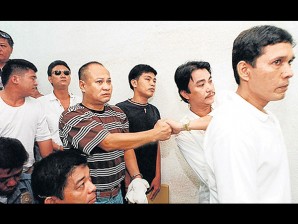Abadilla 5’s fate now up to President Aquino

MERRY CHRISTMAS? Tension is writ all over the faces of the five accused in the killing of former PC Colonel and Ilocos Norte Vice Gov. Rolando Abadilla as they await the promulgation of the case by Judge Jaime Salazar on Aug. 11, 1999, in Quezon City. The judge found the five guilty but they have steadfastly professed innocence. INQUIRER PHOTO
One stroke of the presidential pen, and their nearly two-decade-long ordeal will be over.
The Board of Pardons and Parole (BPP) has recommended to President Benigno Aquino III the commutation of the life sentences meted out to the so-called “Abadilla 5” for the assassination of a dreaded martial law enforcer, a fitting end to their struggle to sustain their plea of innocence, according to the chief public defender.
The recommendation, which the BPP transmitted to the Office of the President last September, sought to have the life sentences of Lenido Lumanog, Cesar Fortuna, Joel de Jesus, Rameses de Jesus and Augusto Santos reduced to 16 years each, explained chief public attorney Persida Rueda-Acosta.
When you factor in the credits the five have earned for good behavior, the sentences could be considered as having been served, said Acosta.
“Right now, what is important is their liberty more than their innocence,” Acosta said, a sentiment shared by the families and some ardent supporters of the Abadilla 5, the term by which the five came to be known after the name of the murder victim, Col. Rolando Abadilla.
Article continues after this advertisement“It’s the best chance they have to be free. I hope the President grants their request,” she added.
Article continues after this advertisementMalacañang on Friday said all recommendations for clemency will depend on Mr. Aquino.
Deputy presidential spokesperson Abigail Valte said she would check with the Office of the Executive Secretary on the status of the reported BPP recommendation for commutation.
“It will ultimately rest on the decision of the President,” Valte said in a phone interview.
Ecstatic over Christmas
Lumanog’s wife, Malou, was ecstatic over the likelihood of spending Christmas with her husband at the family home. For the past 15 years, she and the children would make the long drive to the hills of the Bilibid reservation to spend Christmas with Lumanog.
“We’ve endured for years and the thought of my husband’s freedom is closer to reality than it used to be. This is it,” she said in a phone interview.
Malou said she came to know of the latest development in the Abadilla 5 case after she went to the BPP to verify the status of her husband’s application for commutation. To her delight, she found out that the board had recommended the commutation of the life sentences of the five.
Aside from the backing of the Public Attorney’s Office, the Abadilla 5 also obtained the support of the Episcopal Commission on Prison Pastoral Care of the Catholic Bishops’ Conference of the Philippines for the commutation, according to Acosta.
Liberty over innocence
As to whether the commutation would entail the prisoners’ admitting to the crime—which would be unthinkable for the five—Acosta said it was irrelevant at this point.
“Their liberty takes precedence over their innocence, if you ask me,” the public defender said.
“Take note that time isn’t on their side,” she said, noting that most of the convicts are battling life-threatening diseases, like Lumanog who is afflicted with a kidney disorder.
Seeking the Abadilla 5’s retrial will not only entail additional costs but also exacerbate their agony as they would continue to be incarcerated, Acosta said.
For the Abadilla 5’s main champion, running priest Robert Reyes, the people, and not the courts, are the ultimate arbiters in the case.
“History will judge them accordingly, despite their conviction by the courts,” Reyes said in a phone interview.
“We’ve proven their innocence, that these five are merely fall guys in Abadilla’s murder,” he said.
Reyes appealed to Mr. Aquino to look into the convicts’ appeal and grant them their freedom in time for Christmas.
Families’ appeal
When the families of the convicts learned about the possibility of their being set free through commutation, they prepared for the prospect of spending Christmas together by saving up for the event, the priest said.
Some family members even canceled major expenditures, including deferring surgeries and the like, at the thought of the Abadilla 5 leaving prison becoming imminent, Reyes recalled. They wanted to prepare for the “big day,” he said.
Malou Lumanog agreed with Acosta and Reyes that her husband’s innocence was irrelevant. What was important to the family was to be with Lenido by Christmas, if it was possible, she explained.
“When Lenido was incarcerated, our children were still small,” Malou said.
“Now, all of them have their own families. He missed much of their lives because of a crime he did not commit,” she said.
Last February, the Supreme Court affirmed the conviction of the Abadilla 5, upholding the decision of the Court of Appeals affirming the murder conviction by a Quezon City trial court despite allegations of torture by their police custodians.
The appellate body gave credence to the eyewitness testimony of Freddie Alejo, a security guard of Blue Ridge subdivision in Quezon City where Abadilla was fatally shot in 1996.
The high court said the lower court and the appellate court “did not err in rejecting their common defense of alibi.”